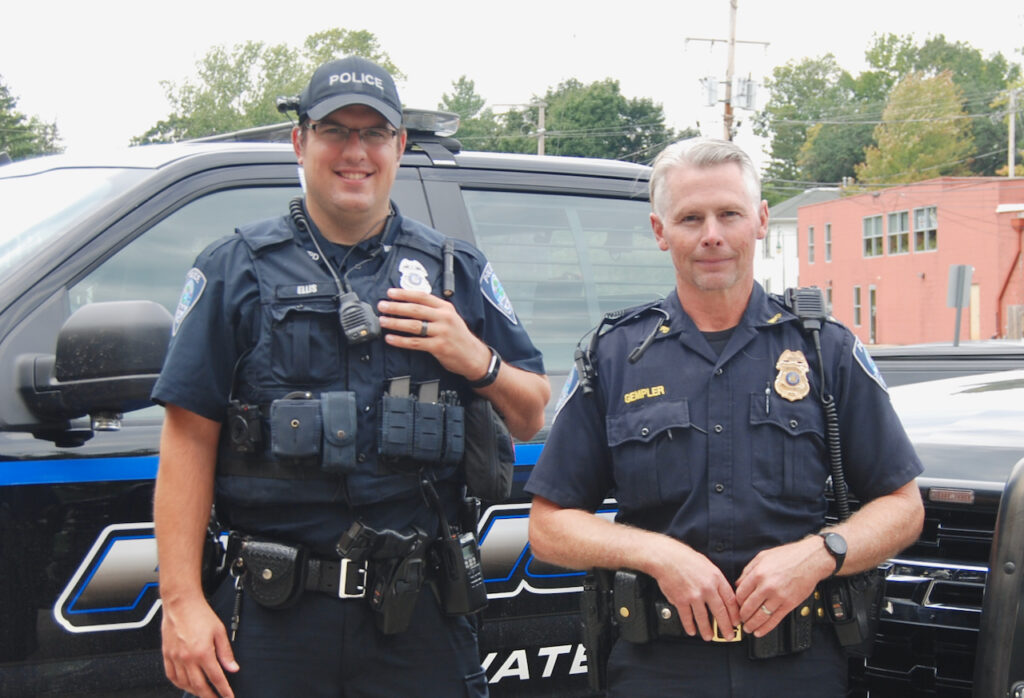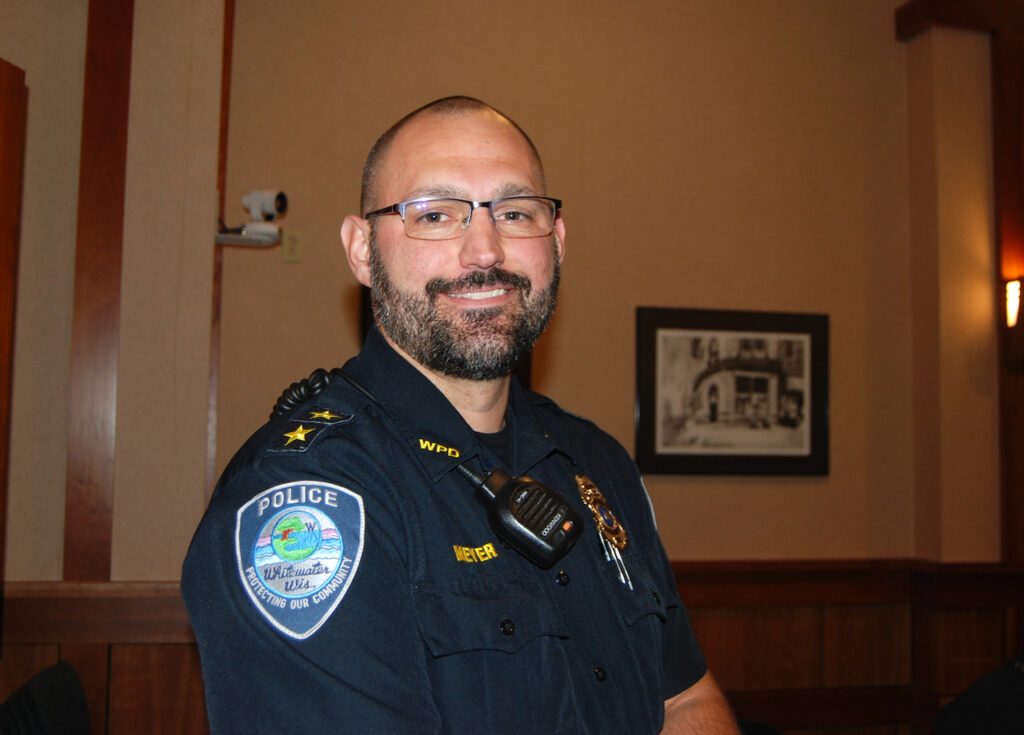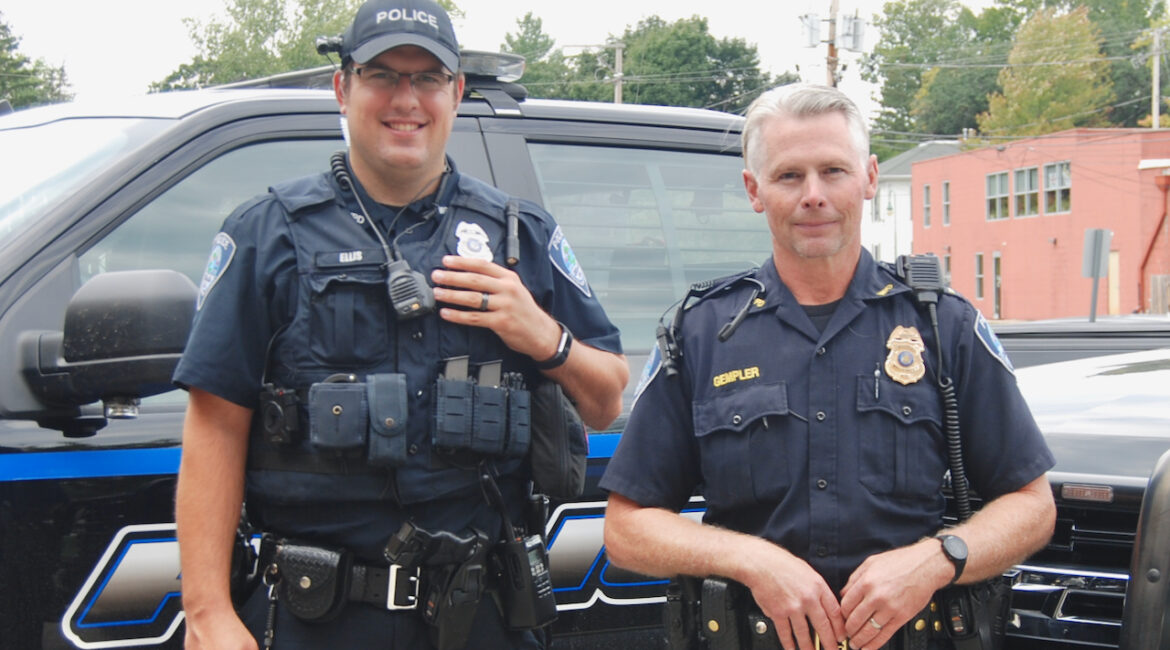Editor’s note: This is the second in a two-part story about policing trends. Recently a report produced by the statewide nonprofit news agency, The Badger Project, pointed to trends in policing, noting that law enforcement agencies across the state were experiencing “historic lows” when seeking applicants to serve in law enforcement jobs, while simultaneously experiencing increases in crime. Fort Atkinson Online has interviewed both Fort Atkinson Police Chief Adrian Bump — whose comments about policing trends were published in Part 1 — and Whitewater Police Chief Dan Meyer, whose comments follow.
By Kim McDarison
As noted in Part 1 of this two-part story, a recent news story shared broadly and written by The Badger Project’s managing editor Peter Cameron reports statewide trends showing a decrease in applicants in Wisconsin for law enforcement jobs. At the same time, the report notes trends across the state of increasing crime rates.
A link to The Badger Project’s story is here: https://fortatkinsononline.com/the-badger-project-number-of-police-in-wisconsin-at-historic-lows-continues-to-drop/.
In separate interviews, Fort Atkinson Police Chief Adrian Bump and Whitewater Police Chief Dan Meyer talked about policing trends in their respective communities and compared them with those reported statewide. Bump’s comments are found here: https://fortatkinsononline.com/statewide-policing-trends-show-low-numbers-of-applicants-higher-crime-local-chiefs-weigh-in/.
In this, Part 2, of Fort Atkinson Online’s story, Meyer talks about policing trends in Whitewater.
Building, maintaining a force
In an interview conducted earlier this month focusing on his recent appointment as the city’s police chief, Meyer said he has 24 sworn officers, which, he noted, is the same number of sworn officers the department had when he joined as a patrol officer in 2010.
“We have hired some very solid people in the last few rounds. We just hired two new people who are at the law enforcement academy in Kenosha. This whole organization is a very great group of people,” he told Fort Atkinson Online in the earlier interview.
Responding by email to additional questions addressing trends identified by The Badger Project, Meyer said that he would like to see the number of sworn officers in Whitewater increase.
“I believe our call volume here justifies an increase. The simple fact is that as our staff becomes stretched thin, our activity as a department becomes increasingly ‘reactive.’ In order to be a more ‘proactive’ department, it’s important for officers to have unobligated time to devote to things like traffic enforcement, drug enforcement, and community interaction,” Meyer said.
He continued: “We can reduce traffic accidents by enforcing our traffic laws. We can help reduce drug overdose deaths by interrupting the supply chain and the cycle of addiction through drug enforcement. We can improve our community’s trust in our staff when officers have time to do business checks and attend special events. As important as all of these things are, they fall to the wayside when officers have to go call-to-call responding to priority calls, many of which may have been preventable with a more proactive style of policing.”
Like Bump, Meyer cited limited financial resources as among barriers when looking to increase the number of sworn officers on his force.
He pointed to an upcoming referendum question that will be placed on the November ballot, asking city of Whitewater voters to fund increases in fire and EMS personnel.
Bump recently noted that his department increased by two sworn officers after the voters in Fort Atkinson approved an EMS referendum in April.
In Whitewater, Meyer said: “The referendum is of critical importance to the police department just as it is to Fire and EMS. It’s important for the community to know that the referendum will have far-reaching impacts regardless of the outcome. However, if the referendum fails, the police department — and most other city departments — will be financially impacted, potentially impacting our staffing levels. We will also be much more likely to be the first responder on-scene for medical issues that our officers are trained at only a basic level to handle. In my opinion that is a disservice to those needing care, and also reduces our officers’ unobligated time.”
As earlier reported by Fort Atkinson Online, both chiefs agreed that they were receiving fewer applications when searching for new officers, which, as reported by The Badger Project, is in line with statewide trends.
In Whitewater, in an earlier interview, Meyer said, “It is getting harder to find people.
“Ten years ago, there might be 200 applicants for one patrol job.”
He added that when the department recently went looking for new hires, about 25 people applied. “And that’s better than other places, I’ve heard,” he said.
Looking at causes for the decrease in applicants, both chiefs cited recently formed perceptions about law enforcement, often enhanced by the media, as among influencers.
Meyer cited “the national narrative,” and some of what he described as “anti-law-enforcement” messaging in general.
“I think that’s impacted people and has kept people away from this field,” he said, adding: “I see hiring as a pendulum. We are on the extreme end right now. As the economy does well, people go to private sector work. As the economy gets worse, they go to public sector jobs.”
While Meyer did not provide a salary range in his responses, information reported by salary.com, as of Aug. 29, 2022, states that the average patrol officer salary in Whitewater is $59,546, and the typical range falls between $55,641 and $64,840. The website reports that salary ranges vary depending on education, certification, additional skills, and the number of years spent in the profession, among others. According to the site, the average salary paid in Whitewater falls at the median as compared to the national average. The site reports that among human resources departments reporting data, half report paying officers between $52,086 and the median salary, and half offer salaries starting at the median and pay up to $69,659. A link to the data is here: https://www.salary.com/research/salary/benchmark/police-patrol-officer-salary/whitewater-wi.
Looking at training, Meyer wrote: “We have an exceptional staff here at WPD (Whitewater Police Department), and we are focused on ensuring that our employees are as highly trained as possible so that we can provide a high level of service to our community. In order to remain certified, the state requires officers to have 24 hours of training every year. Many of our officers approach or exceed 100 hours of training annually. This training is critical when looking at the variety of functions that officers now provide.”
In addition, he said: “Recently, Whitewater has undergone a demographic shift related to an influx of individuals from Central America. This has created a number of challenges for our officers, with the largest being communication, as many of the new community members speak a dialect of Spanish. Our department has responded to this need, and just this week, rolled out a Spanish language learning program and will be providing staff 30 minutes of on-duty time daily to train.”
Meyer noted that changing community demographics in Whitewater is not new to the city’s policing staff.
“We see an entirely new group of young people living in the community every four years or so. Whitewater is a very dynamic community. I think that is one of the reasons people are attracted to it, and a big reason people want to work here. From a law enforcement perspective, working here requires you to be open to learning and willing to put in an honest day’s work every single day. I’m thankful for the excellent group of individuals we have here,” he said.
A community connection
Meyer did not offer specific comment describing the department’s relationship with the Whitewater community.
In an earlier interview, he said one of the benefits of being a police chief is the opportunity to “shape the department.”
As he takes the helm, and in light of the recent influx of residents from Central America and the community’s changing demographics, Meyer told Fort Atkinson Online in an interview earlier this month that a question he asks himself is: “How do we positively connect with them so they trust us? Because they come from a place where you don’t want to meet law enforcement in a dark alley.
“The new situation in January of 2022 started hitting all of us because of the demographic change.”
Meyer noted in the earlier interview that he likes challenges.
Looking to the future and goal-setting, Meyer said all of the department’s command staff, including himself, have a goal set of being out of the office for four hours a week or 10% of the work week.
He described a recent situation where two officers were in Elkhorn working with the district attorney’s office when an incident happened in the city. In that case, he said, he and a captain responded. The goal is for all members of the department to help out where they can, he said.
Applicants down, crime up
Also noted by The Badger Project as a statewide trend, while applicants for police jobs are going down, crime is going up.
Bump recently told Fort Atkinson Online that statistics in Fort Atkinson are in keeping with that finding.
Looking at the different categories of crime, he said, crimes such as burglary and theft are not increasing as much as crimes of impaired driving, disorderly conduct and assaults.
Meyer did not provide specifics in overall crime data. He recently reported during a Whitewater City Council meeting that crimes associated with new residents from Central America were resulting in an increase in traffic violations such as crashes, operating without a license and operating while intoxicated. He also noted that his department was responding to more calls about concerns of over-occupancy at one of the city’s apartment buildings. A link to a story, citing those concerns, is here: https://fortatkinsononline.com/whitewater-police-chief-expresses-concerns-with-ongoing-influx-of-new-community-members/.
An earlier interview with Whitewater Police Chief Dan Meyer, describing his policing history in Whitewater and goals for the future, is here: https://fortatkinsononline.com/whitewater-from-patrol-officer-to-chief-dan-meyer-says-hes-invested/.
A story about the Whitewater Common Council’s recent deliberations as it drafted a fire and EMS staffing referendum question, which will appear before the city’s voters in November, is here: https://fortatkinsononline.com/whitewater-city-eyes-updated-fire-ems-1-million-operational-referendum/.
A press release from the city of Whitewater, further describing the fire and EMS staffing referendum, is here: https://fortatkinsononline.com/whitewater-council-approves-placement-of-ems-staffing-referendum-on-november-ballot/.

Whitewater Police Officer Richard Ellis, at left, and Police Lt. David Gempler are among staff members on duty in Whitewater Saturday afternoon. Ellis has served as a sworn member of the force for nine months, previously serving as a dispatcher for over a year. Working as a dispatcher helped him prepare for the types of calls to which he, as an officer, responds, and helped him develop skills in multitasking, he said, adding that he likes his work because “I like being able to help people when they most need it.” Gempler is a 29-year veteran of the force who began his career at the University of Wisconsin-Parkside, serving there for one year. While he described the Parkside campus as more rural than Whitewater, he grew up in Platteville. He described the community and campus as similar to Whitewater. Said Gempler: “After 30 years, there is so much I enjoy.” At the top of his list, he said, is getting to know the people in the community he serves. Kim McDarison photo.

Whitewater Police Chief Dan Meyer, file photo/Kim McDarison.
This post has already been read 2156 times!
